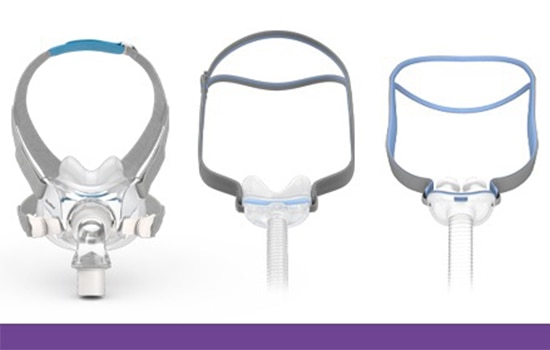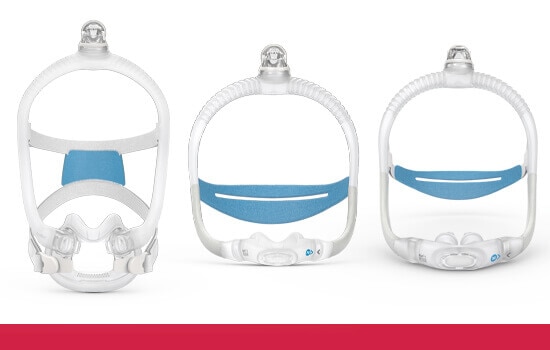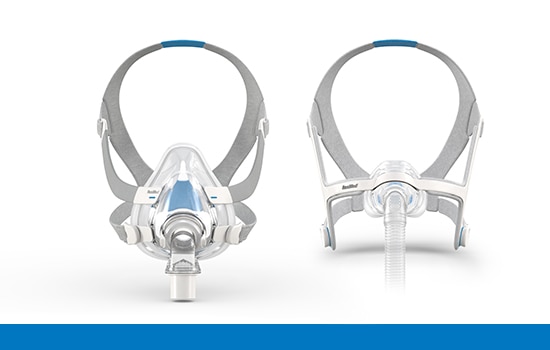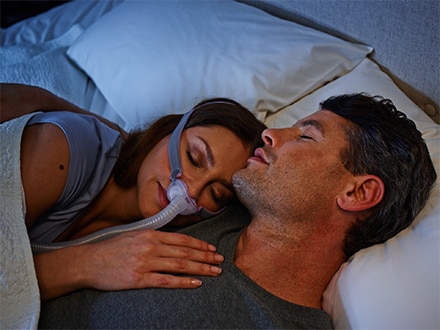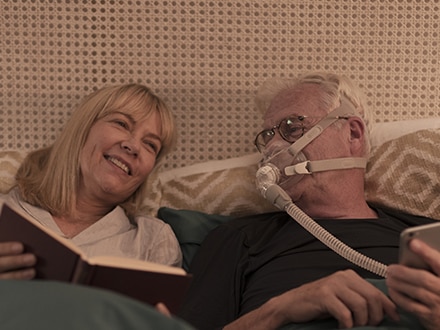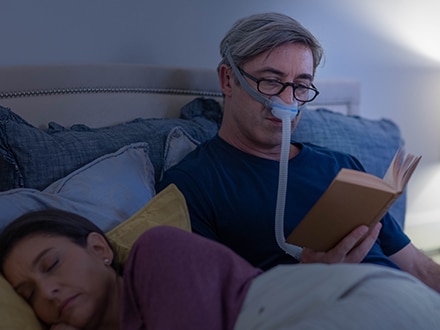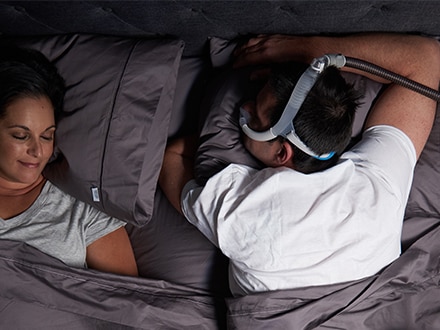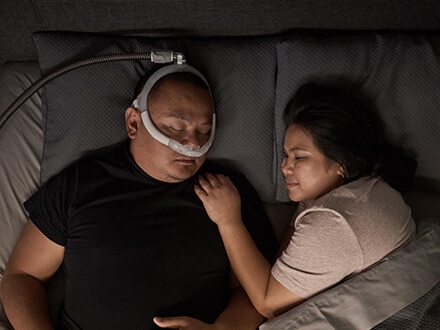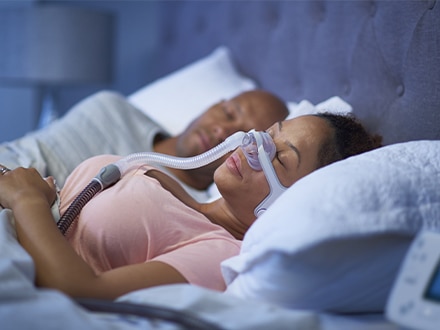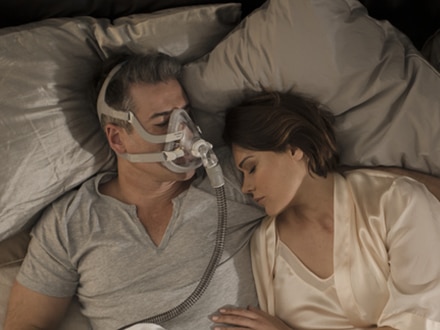Start your therapy with the right CPAP mask

Choosing a mask that’s comfortable and effective for you is an important first step on your CPAP therapy journey. We’ve divided our masks into three categories, Minimalist, Freedom and Versatile Fit, to help guide you to a CPAP mask that suits your needs.
Are you a simplicity lover? You want a CPAP mask that:
Help combat claustrophia with an under-the-nose cushion, makes you feel less self-conscious and allows you to wave goodbye to red marks on the bridge of the nose. Our Minimalist mask category features masks that are designed to meet those needs.
Minimalist CPAP masks
If you’re a simplicity lover, our minimalists masks are designed for you.
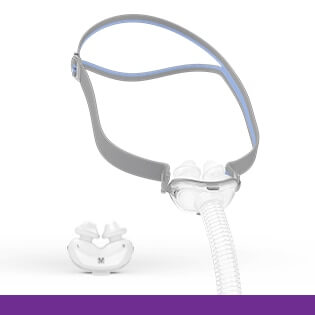
AirFit P10 nasal pillows CPAP mask
A discreet, lightweight option with pillow inserts resting at the entrance of your nose, plus a vent for minimal noise disruption throughout your CPAP therapy.
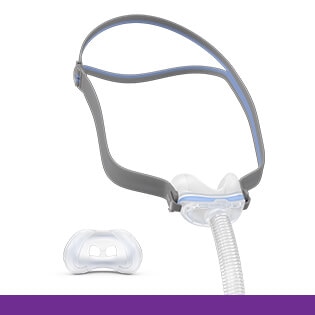
AirFit N30 nasal CPAP mask
Small, quiet and easy to use, the AirFit N30 nasal mask features an under-the-nose cushion and QuietAir vent for comfortable therapy in peace.
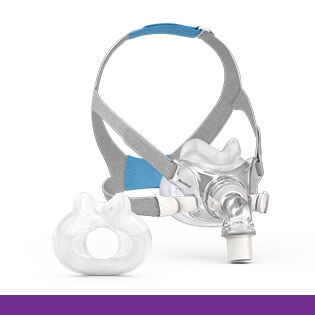
AirFit F30 full face CPAP mask
A full face mask featuring an under-the-nose cushion and QuietAir vent to give you a wide field of vision and comfortable CPAP therapy with less noise disruption.
Are you an active sleeper? You want a CPAP mask that:
Eliminates red marks on the bridge of you nose and lets you move as you please with a tube-up design and 360◦ elbow, keeping belly sleeping an option throughout the night. Our Freedom mask category features masks that are designed to meet those needs.
Freedom CPAP masks
If you’re an active sleeper, tube-up Freedom masks are designed for you.
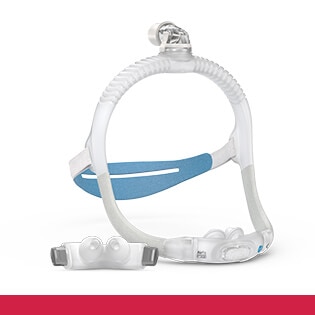
AirFit P30i nasal pillows CPAP mask
A quiet, tube-up mask with pillow inserts resting below your nostrils. A compact, discreet option designed in the name of giving you a good night’s sleep and the freedom to move as you please.
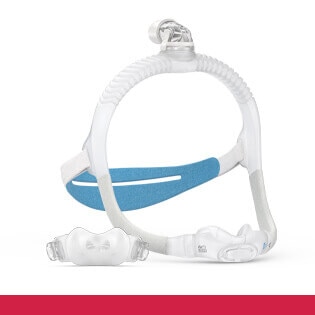
AirFit N30i nasal CPAP mask
Featuring a top-of-the-head tube, this mask is designed with freedom of movement in mind, plus an under-the-nose cushion helps deliver practical, comfortable sleep therapy.
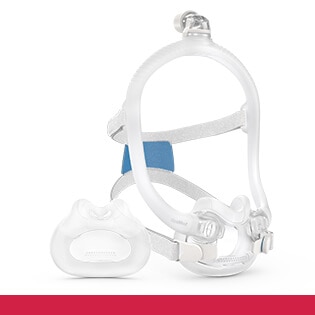
AirFit F30i full face CPAP mask
Sleep in the position you like best and enjoy a secure, comfortable fit with an under-the-nose cushion that lets you say goodbye to red marks on your nasal bridge.
Are you a reassurance seeker? You want a CPAP mask that:
Fits your face easily, provides an effective seal, and is compatible with silicone and AirTouch foam cushions, for when you need extra comfort and want to limit red facial marks. Our Versatile Fit mask category features masks that are designed to meet those needs.
Versatile Fit CPAP masks
If you’re a reassurance seeker, Versatile Fit masks are designed for you
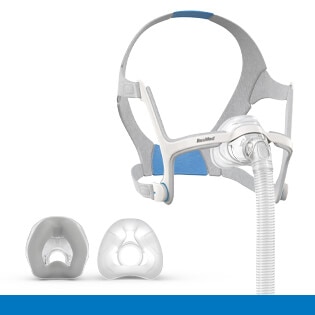
AirFit N20 nasal CPAP mask
Designed to fit all faces, the AirFit N20 adapts to your facial structure and size to deliver an effective seal. For extra comfort, swap the traditional silicone cushion for an AirTouch memory foam cushion.
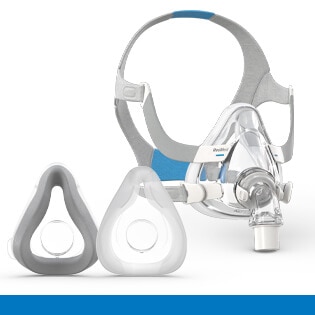
AirFit F20 full face CPAP mask
A full face mask that’s engineered to fit every face while providing an effective seal, the AirFit F20 is compatible with AirTouch memory foam cushion, for when comfort is your priority.
CPAP mask FAQ
The design of a CPAP mask affects where the pressurised air is delivered and how the mask sits on your face:
- Full-face CPAP masks deliver air to your nose and mouth
- Nasal CPAP masks deliver air to your nose and do not cover your mouth
- Nasal pillows CPAP masks have two soft inserts that deliver air directly into your nostrils and do not cover your mouth
Different mask styles can offer different benefits. For example, a full-face mask can be a good option if you breathe through your mouth at night, if you suffer from allergies or if you have a deviated septum or another condition that blocks the passage of air through your nose.
Some people prefer the smaller size of nasal or nasal pillows masks, while others appreciate the reassuring coverage of a full-face mask. Even something as simple as having a moustache can affect how a mask feels and fits.
If possible, try on different styles of CPAP mask. To help make choosing a little easier, our CPAP mask categories show how different masks can meet your sleep habits or preferences. These mask categories contain full face, nasal and nasal pillows mask designs.
Each of our masks has a dedicated web page featuring support videos and advice on sizing.
Many of our masks have a printable sizing template. Simply print out the template and hold it to your face to identify a cushion size that should suit you. Click on the links to download sizing templates for the following masks:
Minimalist masks:
- AirFit N30 nasal mask sizing template
- AirFit P10 nasal pillows mask: no need for a template – the mask pack contains all cushion sizes so you can try them out
- AirFit F30 full face mask sizing template
Freedom masks:
- AirFit N30i nasal mask sizing template
- AirFit P30i nasal pillows mask: no need for a template – the mask pack contains small and medium cushion sizes so you can try them out. A Large pillows cushion (L size) is available as a spare part if you find that the size M is too small.
- AirFit F30i full face mask sizing template
Versatile Fit masks:
Each of our masks has a dedicated web page featuring support videos and advice on getting a good fit.
A well-fitting mask will feel comfortable and will provide a stable seal so that air does not leak out. If air leaks out of your mask (mask leak) or your mouth (mouth leak), you won’t receive the full benefits of CPAP therapy.
A poorly fitting mask can be uncomfortable and won’t work so well, so spend some time learning how to put your mask on properly. Take a look at the user guide and fitting videos for your mask. You might find it helpful to use a mirror or ask someone to check if the cushion/pillows are positioned properly.
- Fit your mask before connecting the tubing or turning on your therapy device. Each mask type has a specific fitting sequence, so it’s best to follow the steps in the user guide or fitting videos.
- Try not to over-tighten your mask. People often think that a tight mask will provide a good seal, but over-tightening can actually result in leaks as well as being uncomfortable.
- Once your mask is correctly positioned on your face, turn the air flow on. You may need to make minor adjustments to the cushion and/or the headgear once the device is turned on and the cushion has inflated.
You can also download the myAir app for free. It’ll provide you with personalised coaching and support based on your specific sleep apnoea machine and mask type, such as tips to help you correct mask fit issues.
If you’re still having difficulty fitting your mask, ask your care provider to help you.
Air leaks can occur for a number of reasons. Please see the following FAQs for information on identifying and resolving leaks caused by:
- Poor fit or over-tightening: see ‘How do I fit my mask?’
- Tube drag: see ‘How can I prevent tube drag?’
- Mask style: see ‘What’s the difference between full-face, nasal and nasal pillows masks?’ and ‘How can I prevent mouth leak?’
- Mask size: see ‘How do I choose the right cushion size?’
If you have ‘mouth leak’, air is escaping from your mouth during therapy. You might be opening your mouth during sleep out of habit or because your nose is blocked. As well as being noisy and uncomfortable, mouth leak can leave you with a dry mouth.
You can download the myAir app for free. It’ll help you to manage leaks by sending you alerts when leak thresholds are exceeded and give you tips to help you correct leaks and mask fit issues.
If you experience mouth leak occasionally, for example when you have a cold, try wearing a chin strap/chin restraint at those times to keep your mouth closed.
If you experience mouth leak often, you may need to use a full-face mask. Full-face masks deliver air through your nose and mouth, so you’re covered whether you end up breathing through your nose or your mouth.
We have a full-face mask in each of our mask categories: AirFit F30 minimalist mask, AirFit F30i freedom mask, AirFit F20 versatile fit mask.
All CPAP masks make some noise as exhaled air goes out through the vent. However, if your mask is making burping sounds, you probably have a leak. If you are experiencing leaks, it would be a good idea to work on your fitting technique. Please refer to your mask user guide, fitting videos and the ‘What causes leaks?’ question above for assistance. If your mask continues to leak, you should contact your homecare provider as you might need a different mask style or size.
If it is simply noise from the mask’s air vent that is bothering you or your bed partner, you might appreciate the QuietAir vent that features on our Minimalist masks. (N30, P10, F30). It gently diffuses exhaled air and is designed to help keep noise disruption to a minimum.
‘Tube drag’ occurs when your CPAP tubing pulls on your mask and affects the seal, causing leaks. If you don’t realise it’s happening, you might think your mask is leaking due to a problem with the the style or fit, or end up over-tighting your mask and causing more leaks.
Many masks are designed to manage a certain level of tube drag. With the device turned on, pull gently on the tube to find out what tube drag feels like. Lie on your bed and roll around a bit to see if your tube gives you enough room to move. If you think you would benefit from longer tubing, check out the additional tubing options on this page.
If you are an active sleeper, sleep on your stomach or try different positions before falling asleep, you might appreciate the design of our freedom masks (N30i, P30i, F30i). Their top-of-the-head ‘tube-up’ design lets you move around without getting tangled in your tubing.
ResMed mask cushions are made from silicone, which is a hypoallergenic material used in medical appliances and devices. If you don’t tolerate silicone, an AirTouch F20 or AirTouch N20 versatile mask could be a good alternative. These masks have a breathable memory foam cushion that is designed to adapt to your face.
Our Versatile Fit category could be a good choice if you have sensitive skin, thick facial hair or simply appreciate extra comfort. The frames of these masks are compatible with our classic silicone AirFit mask cushions and our AirTouch memory foam mask cushions, allowing you to switch between the two as you please.
If you only experience skin irritation on the bridge of your nose, you might appreciate one of the small, under-the-nose silicone masks in our Minimalist and Freedom mask categories.
Keep exploring
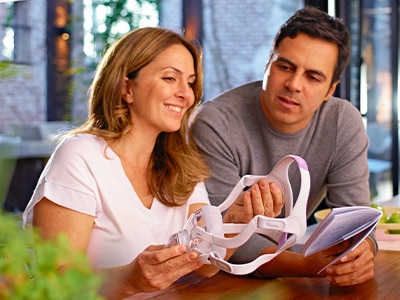
Starting CPAP therapy for sleep apnoea
If you’ve recently been diagnosed, you might have some questions or concerns or just want some friendly advice. We’re here to help you get your CPAP therapy off to a successful, comfortable start.

Real stories from real patients
Learn more by watching real people share their personal experience of sleep apnoea therapy. They discuss the ups and downs and share their tips for enjoying successful CPAP or MRD therapy.
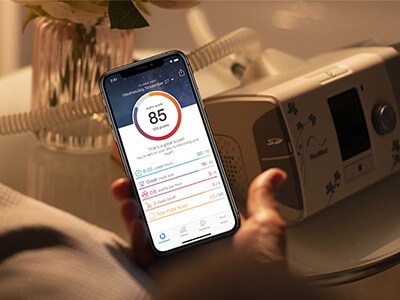
Monitor your sleep apnoea therapy
Is my sleep apnoea therapy working? Am I still having apnoeas? Monitor your CPAP therapy and get personalised advice and assistance on making the most of your therapy with the myAir app.
Please refer to the user guides for relevant information related to any warnings and precautions to be considered before and during use of the products.
* Any quotations appearing on this page are creative works inspired by patient feedback and are not verbatim.
